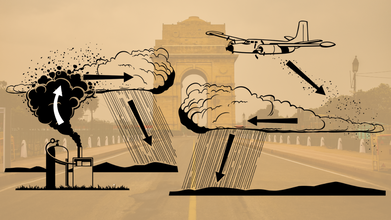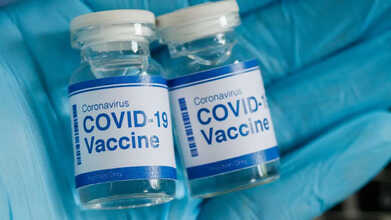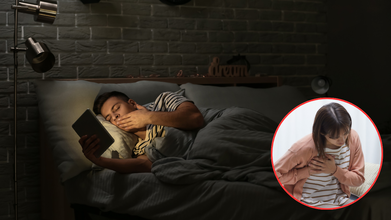- Health Conditions A-Z
- Health & Wellness
- Nutrition
- Fitness
- Health News
- Ayurveda
- Videos
- Medicine A-Z
- Parenting
- Web Stories
How Does Cloud Seeding Works In Curbing Air Pollution And Its Toxic Impact On Health?

Credits: Canva and Wikimedia Commons
The Delhi government is all set to conduct its first ever environmental experiment known as artificial rain on Wednesday. Chief Minister Rekha Gupta confirmed that Delhi will experience its first artificial rain on October 29. Many have predicted that this will improve the air quality in the national capital and also bring down the pollutants level, including the PM2.5 in the year. The levels have gone up since Diwali, and has recorded the highest in the last five years, says report.
As per health experts and doctors, the poisonous air can impact human health in many ways, including:
- Respiratory issues
- Asthma
- Bronchitis
- COPD
- Spiking the risk of cardiovascular disease
- Heart attack
- Heart strokes
- Lung cancer
- Premature death in infants and children
Children are most vulnerable to the negative impact of toxic air. Furthermore, the high levels of pollution could also lead to other systemic issues, including affecting the brain, skin, and other organs.
How Does Artificial Rain Work?
Artificial rain will be orchestrated through cloud seeding. This is a project led by IIT Kanpur in coordination with the India Meteorological Department (IMD). This will artificially trigger rainfalls over parts of Delhi.
As per experts, this is a bold initiative and is a scientific attempt to tackle the city's recurring pollution problem. This is a weather modification technique that enhances rainfall by encouraging condensation in clouds. It does not create rain, but increases the likelihood of rainfall from existing moisture-packed clouds.
Chemicals are used as seeding agents, including silver iodide, potassium iodide, salt, and dry ice or frozen CO2. These agents are released into the air with the help of cloud seeding aircraft, and rockets.
What happens then is the silver iodide helps in formation of ice crystals in cold clouds and allows the water to cling to them. The precipitation increases and droplets grow larger, eventually leading to a rainfall.
Can Artificial Rain Put Delhi's Pollution Problem To A Rest?
As per experts, its benefit could only be measured based on the amount of moisture present in cloud, wind, and temperature conditions, along with timing and the type of seeding, the size of the area that is being seeded. There are studies that say the benefits of cloud city could have a huge range, from a 5 per cent to 20 per cent spike in precipitation.
The process has been successfully implemented in China, the UAE and parts of the United States in order to increase rainfall.
As per experts, if the artificial rain is implemented well, it could wash down particulate matter or PM2.5 and PM10. However it is to be noted that this is only a temporary solution to improve AQI, but nevertheless, it can help with breathing and other respiratory issues people are facing.
Delhi's AQI As Of 28 October, 6.30 AM
- As per the National Air Quality Index, as of 6.30 am, Anand Vihar recorded an AQI of 348, putting it under the 'very poor' category.
- Kashmere Gate recorded AQI of 299, under 'poor' category
- Rohini recorded an AQI of 346, under 'very poor' category
- Nangal Thakran, an area in Delhi recorded an AQI of 401, placing it under 'severe' category
- ITO recorded an AQI of 336, placing it under 'very poor' category
- Nazafgarh recorded an AQI of 307, placing it under 'very poor' category
- Azadpur recorded an AQI of 351, placing it under 'very poor' category
How To Read AQI?
As per the Central Pollution Control Board, here's how the data on AQI can be interpreted- 0-50 is considered ‘good’
- 51-100 is considered ‘satisfactory’
- 101-200 is considered ‘moderate’
- 201-300 is considered ‘poor’
- 301-400 is considered ‘very poor’
- 401-500 is considered ‘severe’
Doctor Issues Warning To Anyone Taking Omeprazole For Acid Reflux — Here’s Why It Could Be Risky

Credits: Canva
BBC Morning Live’s Dr Punam Krishan has cautioned people who regularly use proton pump inhibitors (PPIs) such as omeprazole to manage heartburn, acid reflux, and indigestion. In the UK, one in four adults experiences acid reflux, especially after large meals, and many turn to PPIs to relieve symptoms. However, Dr Punam explained that long-term use of these medications could pose certain health risks and urged patients to have their prescriptions reviewed regularly.
Dr Punam, a practising NHS GP and resident medical expert on BBC’s Morning Live, is also a well-known health broadcaster and author of children’s books.
Omeprazole Warning For Acid Reflux
Speaking to hosts Gethin Jones and Helen Skelton, she began by explaining how acid reflux develops. “Acid reflux happens when stomach acid travels back up the food pipe,” she said. “We all have acid in our stomach, it plays a key role in breaking down food. A small valve, or sphincter, at the top of the stomach acts like a trapdoor to keep that acid in place. But when this valve becomes weak or too relaxed, the acid can flow back up the oesophagus, leading to that burning, heavy sensation people often describe.”
She added that large meals, alcohol, and lying down soon after eating can all make reflux worse.
When asked how reflux is usually treated, Dr Punam explained: “If you only experience symptoms occasionally, over-the-counter medicines like antacids or alginates, such as Gaviscon can help by neutralising stomach acid. They’re effective for mild cases and can be used as needed.”
“For ongoing discomfort, we prescribe proton pump inhibitors, or PPIs, like omeprazole or lansoprazole. These medicines are highly effective and have changed the way we treat acid reflux by targeting acid production directly at the source.”
Why Long-Term Use of PPIs Can Be Risky
Dr Punam warned that while PPIs are safe when used correctly, they are not intended for indefinite use. “These medications shouldn’t be taken unnecessarily or for long periods without medical review,” she said. “Extended use can slightly raise the risk of low magnesium or vitamin B12 levels and increase the likelihood of gut infections, particularly Clostridioides difficile, known as C. diff.”
She explained that C. diff is a bacterium that naturally exists in the gut but can overgrow when the balance is disturbed, sometimes causing persistent diarrhoea. “That’s a warning sign,” she said. “If you develop diarrhoea or notice changes in your bowel habits, speak to your doctor immediately. It’s very important to keep up with regular GP reviews if you’re on PPIs long-term.”
How Often Should People on PPIs See a Doctor?
If you are using omeprazole without a prescription, you should not continue for more than two weeks. See a doctor if:
- Your symptoms don’t improve after 14 days.
- Your symptoms get worse.
- Your symptoms return within four months of finishing treatment.
- You notice red flag signs such as difficulty swallowing, vomiting blood, or black stools.
Who Should Avoid the Covid-19 Vaccine? NHS Reveals Full Risk List

Credits: Canva
While the NHS will be inviting many people to receive their Covid-19 vaccinations this year, a small group will need to skip it, even if they qualify for a free jab. Vaccines play an essential role in strengthening our body’s defences against viruses and are especially important during colder months.
This is because illnesses like Covid-19 continue to evolve, which can reduce the immune system’s ability to fight them over time. While the vaccine isn’t mandatory for everyone, it remains strongly advised for those more likely to develop serious illness from a coronavirus infection. Below is the full NHS list of people who are advised not to take the Covid jab.
The NHS generally recommends the Covid-19 vaccine for adults aged 75 and older, those living in care homes for older adults, and individuals with weakened immune systems due to medical conditions or treatments. However, for some, the vaccine may pose risks of adverse reactions, making it unsafe to receive.
Side Effects Of Covid-19 Vaccine
Not everyone who gets a Covid-19 vaccine will notice side effects, but NHS guidance outlines a few common ones, including:
- Aching muscles
- Headache
- Fatigue
- Soreness at the injection site
- Mild flu-like symptoms
These reactions are typically mild and tend to disappear within a week. The NHS recommends taking paracetamol to ease any discomfort during recovery.
Full List Of People Who Can’t Have The Covid Vaccine
The NHS continues to encourage everyone eligible for the vaccine to take it, especially during the winter months when infection rates usually climb. However, a few groups may need to delay or avoid the jab altogether, such as:
- People currently unwell with Covid-19
- Anyone running a high temperature
- Individuals who are feeling generally unwell
- Those at risk of a severe allergic reaction
- People who have recently recovered from Covid-19
If you have previously experienced a severe allergic reaction to the Covid vaccine or any other jab, your GP or vaccination provider may refer you to an allergy specialist who can assess your situation. In some cases, you may be advised to receive the vaccine in a specialist setting, such as a hospital, where any reaction can be managed quickly.
According to NHS guidance, this level of caution is usually only required for those with a history of anaphylaxis. However, even if you’ve experienced mild allergic symptoms before, such as hives, wheezing, or a rashyou may still be able to get vaccinated safely.
If you believe you currently have a Covid-19 infection, it’s best to wait until you’ve fully recovered before booking your jab. The NHS also clarifies that those who’ve recently had Covid-19 may not need the vaccine right away, as their immune system is already primed to recognise and respond to the latest strain.
You can find full details and updates on NHS guidance about the Covid-19 vaccine on their official website.
Exposure To THIS Can Increase Your Chances Of Heart Health Problems By 56%: Study Shows Alarming Cause

(Credit-Canva)
Our habits, like the first thing we do when we wake up, the first meal of the day we prefer and even our bedtime habits, all of these can reveal many things about our health. What people don’t realize is that their ‘harmless habits’ could have major implications for their health. One of these habits is using your phone before you go to sleep. Many people like scrolling on social media or reading books on their electronic devices to relax. However, did you know that the same habit could be the culprit behind your poor heart health?
New research has uncovered a truly concerning problem: there’s a strong link between being exposed to bright light at night and having major heart issues. Because of this alarming finding, scientists are now telling everyone they should buy blackout curtains and make sure they turn off their electronic devices before they get into bed to actively protect their hearts.
How Does Exposure To Light Affect Heart Health?
Researchers from Australia's Flinders University looked closely at the health information of almost 89,000 people in the UK over a period of ten years. They tracked how much light these people were exposed to by having them wear special wrist devices. The results were shocking and clear:
- People who were exposed to the brightest light while they were sleeping at night had a 56% higher risk of experiencing heart failure.
- These same people also had a 47% greater chance of suffering a heart attack.
Importantly, these higher risks were still true even when the researchers checked for other known risk factors that affect the heart, like what people ate, how much they exercised, and their family history or genetics.
Why Night Light is a Major Risk Factor
Dr. Daniel Windred, who led the study, explained that this is the first large study to prove that simply being around light at night is a serious, independent risk factor for heart disease.
The Problem: Exposing yourself to bright light when your body expects darkness confuses your body's natural 24-hour clock (called the circadian rhythm).
The Result: If you keep confusing this internal clock, it puts you at a much higher risk for developing dangerous heart problems.
The researchers also stress that the risk is not just from extremely bright lights. Another researcher, Associate Professor Andrew Phillips, pointed out that even low levels of indoor light—such as looking at your phone in bed, falling asleep with the TV on, or leaving a small light on—can interfere with your body’s natural timing. Because of these findings, scientists now argue that light exposure at night should be considered just as serious a health risk as smoking or having a poor diet.
Simple Ways to Protect Your Heart at Night
The good news is that this is one health risk you can easily control. Scientists offer these three simple habits to protect your heart while you sleep:
Install Blackout Curtains: Put up thick curtains that completely block out any light coming from streetlights or outside your window.
Dim or Turn Off Lights: If you have to get up at night, use the dimmest light possible, and always make sure all lights are turned off when you go to sleep.
Avoid Screens Before Bed: Make a rule to put away your phone, tablet, and laptop well before your bedtime.
© 2024 Bennett, Coleman & Company Limited

